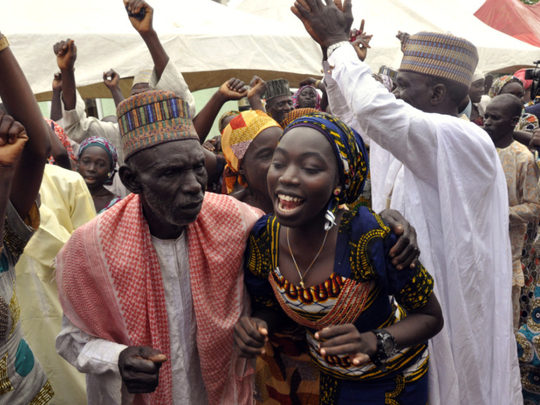
Abuja: Twenty-one of the more than 200 missing Chibok schoolgirls freed after being held by Nigeria’s Boko Haram militants for more than two years on Sunday spoke of their ordeal as they were reunited with their families.
They were taken deep into the Sambisa Forest to Boko Haram’s stronghold, where the more than 200 schoolgirls from Chibok were offered a choice: Join the militants, or become their slaves.
About half of them opted to join and marry the fighters and were taken away, never to be heard from.
Those who refused endured more than two years of servitude, washing, fetching water and cooking for Boko Haram.
During a Christian ceremony held for them in the capital Abuja, a schoolgirl named Gloria Dame said they had survived for 40 days without food and narrowly escaped death at least once.
“I was … [in] the woods when the plane dropped a bomb near me but I wasn’t hurt,” Dame told the congregation.
“We had no food for one month and 10 days but we did not die. We thank God,” she said, speaking in the local Hausa language.
The ceremony was organised by Nigeria’s security services which negotiated their release. Most of the kidnapped students were Christian but had been forcibly converted to Islam during captivity.
The Chibok girls were abducted in April 2014, drawing global attention to the Boko Haram insurgency engulfing the area when US First Lady Michelle Obama joined the #BringBackOurGirls online movement.
Of the 276 girls initially seized, scores escaped in the hours after the kidnapping, while another 19-year-old was found with her four-month-old baby earlier this year.
The ceremony was interrupted when the girls’ relatives arrived and were reunited with them. Tears flowed as they hugged their children.
“We can all see the joy and emotions of the parents,” Information Minister Lai Mohammad said.
He said talks with the Islamists would continue “until all the girls have been released”.
“Very soon, another batch, bigger than this would be released,” Mohammad said.
Garba Shehu, a spokesman for the Nigerian presidency, said that “the Mamman Nur faction of the Boko Haram has indicated its willingness to negotiate the release of more Chibok girls in their custody.
“The group claims that it has 83 more girls to release on negotiation,” he said, without elaborating.
The parents of the freed girls, as well as parents of girls still held captive, were bused to the nation’s capital for a joyful reunion ceremony at a hospital run by the country’s secret police service.
Videos of the ceremony showed reunited families hopping up and down together in celebration, singing Christian songs of praise.
“I felt like it was the day that I born her into this world,” said Ruth Markus, the mother of Saratu Markus, one of the freed girls. “I danced and danced and danced.”
The girls are in the custody of the secret police, and they are receiving medical and psychological care, government officials said.
They were scheduled to meet with President Muhammadu Buhari on Monday.
Buhari, who took office a year ago, had pledged during his campaign to find the girls. Officials have said they expect more girls to be released soon.
As many as 276 girls were taken in April 2014 when members of Boko Haram stormed their boarding school during exam week.
About 50 of them escaped in the initial days after the abduction, but before last week only one had been found since: Amina Ali, who was discovered this year roaming in the forest with a baby.
On Sunday, people from Chibok who met with the girls said they looked gaunt.
“They’ve just become like skeletons,” said Yana Galang, a mother of a still-missing girl and a community leader of the Chibok parents.
Some parents who met with the girls said they had reported that one of the schoolgirls in their group of about 100 died of a snakebite, one died in childbirth (their encampment included male hostages, too) and four died in a bombing.
The Swiss government and the International Committee of the Red Cross helped broker negotiations to release the girls, and the Chibok residents who met with the girls Sunday offered more details about their release.
Militants had gathered the girls recently and told them that they were going home. A few days later, a Red Cross vehicle rumbled into the forest where the girls were held.
Representatives shook hands and talked with a militant and then left. A militant then read from a piece of paper the names of those who were to be freed.
Militants later drove the girls for a couple hours until their vehicle broke down. They pointed them in a direction and told them to start walking.
The girls walked for two days and arrived in a border town where they were able to contact Nigerian officials.












